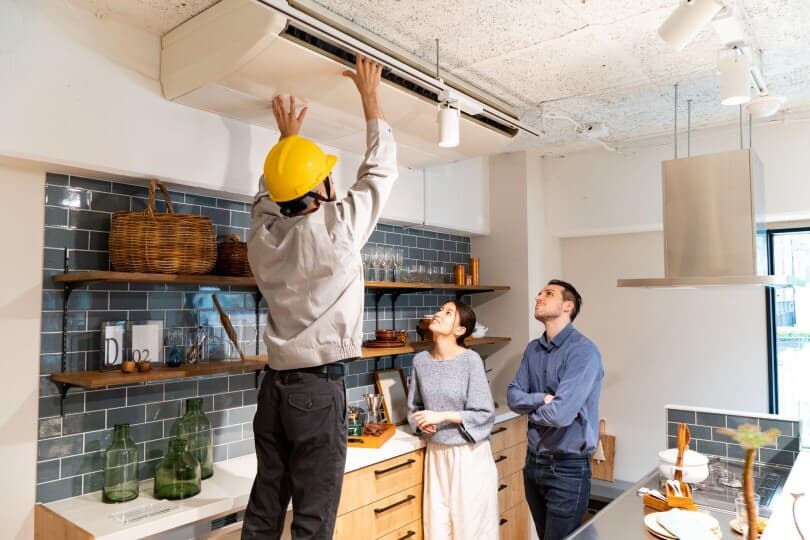LIMITED TIME OFFER! Save BIG with lower interest rates on select homes*! Explore All Promotions
Buyers’ Guide to Home Inspections

To make the process easier, we’ve taken the time to create a buyers’ guide to home inspections that answers many of the popular questions surrounding home inspections. Keep reading to learn all you’ll need to know about home inspections including a handy home inspection checklist.
What is a Home Inspection?
A home inspection is an objective visual examination of the physical structure and systems of a house, from the roof to the foundation, according to the American Society of Home Inspections (ASHI). A licensed home inspector will look over every inch of your prospective home searching for any problems that may require repairs. Home inspections are extremely important because they can reveal hidden issues that you or the owner may have overlooked and save you money in the long run.
What do home inspectors look for?
Experienced home inspectors usually conduct an inspection of an average sized home in 2-3 hours. It’s important that you be there while the inspection is underway so you can ask questions and have context to any issues the inspector finds. According to ASHI, once finished, the inspector will have looked at your home’s:
- heating system
- central air conditioning system (temperature permitting)
- interior plumbing system
- electrical system
- the roof, attic and visible insulation
- walls, ceilings, floors, windows and doors
- the foundation, basement and structural components
How much do home inspections cost?
The cost of a home inspection can vary based on the size of the home, the location, and the additional inspections that are needed. However, you can expect to pay anywhere between $200 to $600 with the national average inspection cost for 2021 being $339, according to Home Advisor.
How to Hire a Home Inspector
Find a qualified and reputable home inspector is extremely important. Start by asking friends who have recently purchased homes if they recommend the person they used. If that’s a dead end, move on to local online communities such as NextDoor or Patch that allow users to post about the inspector they used. Other home services sites like Angie’s List or HomeAdvisor are also helpful because members of these sites can post reviews of specific inspectors or businesses that they have used.
There are also professional organizations such as the American Society of Home Inspectors (ASHI) and the International Association of Certified Home Inspectors that can help you find a home inspector as well. Beware of any recommendations made by your Real Estate agent as they may be recommending someone that can help them get you to close quicker.
Home Inspection Checklist for Buyers
While you should leave the actual inspection to a licensed inspector, feel free to go through your potential home beforehand using the home inspection checklist for buyers below. After your initial inspection, you may have questions for your licensed inspector that can help you get more information out of the inspection process.
Kitchen
______ Exhaust van that is vented to building exterior operates properly
______ Dishwasher operates properly
______ No leaks in pipes under sink
______ Adequate water flow in sink
______ No stains or decay in floor in cabinet
______ Built-in appliances operate properly
______ Doors, drawers and cabinets operate properly
______ No excessive deterioration or rust on waste pipes or garbage disposal
Bathrooms
______ Toilets operate properly
______ Showers, tubs and sinks drain properly
______ Fixtures have appropriate temperature, flow and pressure
______ Cabinet floor and plumbing under sink in good condition
______ No signs of rust on metal fixtures
______ No stains and caulking in good condition in tub and shower area
Interior Rooms
______ Lights, electrical outlets and switches operate properly
______ Heating/cooling source works
______ Walls have adequate insulation
______ No significant cracks or stains in ceilings, floors and walls
______ Ceilings, floors and walls appear straight and level
______ Locks operate easily
______ Windows operate easily and latch properly
______ No broken glass or decay in windows
______ Wall covering, paint, wood trim and paneling in good condition
Exterior of Home
______ Proper downspout drainage away from home
______ No leaks from leach field or septic tank
______ Exterior structures in good condition
______ Adequate and secure railings on decks and stairs
______ Sides of house appear straight
______ Foundation appears straight and plumb, with no significant cracks
______ No cracking, rot, decay or curling in siding
______ No stains on surfaces
Roof
______ No mold, decay, rust or rot
______ No broken/cracked/missing shingles
______ No curling or cupping
______ No cracks, splits or patches
Heating/Cooling System
______ Operates properly throughout home
______ No rust
______ No combustion gas odor
______ Clean air filter(s)
______ No asbestos
______ Ductwork in good condition
Electrical & Plumbing
______ No damage, rust or evidence of leaks
______ Ideal hot water temperature achieved
______ Wiring in good condition
______ Adequate capacity for service panel
Other
______ Smoke and carbon monoxide detectors operate properly
______ Stair handrails in good condition
______ Garage door opener operates properly
______ No stains, decay, damage or major cracks in foundation
______ No evidence of insect or moisture damage
